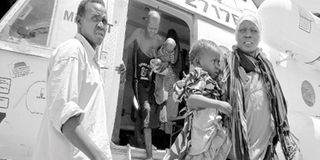No war over Abyei, but Khartoum combative as UN calls for pullout

Dinka Ngok civilians, displaced as a result of the recent military offensive by the northern Sudan Armed Forces (SAF) on Abyei, arriving in Turalei in Warrap State, southern Sudan, about 130kms south of the contested district after being evacuated by the UN. AFP
KHARTOUM
When northern troops overran Abyei two weeks ago, observers feared Sudan was sliding back to war.
This now seems unlikely, but analysts warn that Khartoum will continue to assert itself aggressively ahead of southern independence.
Despite pressure from the international community to pull back, and strong criticism from Washington, the Sudanese government remains defiant, raising the the likelihood of a grim stalemate when the south secedes on July 9.
Mr Roger Middleton, Sudan expert at the Chatham House think-tank, says the north’s occupation of the bitterly disputed border region had clear objectives, in the context of the north and south negotiating their future relationship.
“I think there’s two things going on. One is taking a strong line with the south, and trying to make sure that... when this new relationship begins, it’s Sudan that is the powerful partner,” he said.
“But then there’s also a shoring up of positions within the regime in Khartoum,” he added, following the “embarrassment” of losing the south, where around 75 per cent of the country’s oil revenues lie, in January’s independence referendum.
At the time, southerners voted overwhelmingly to split with their former civil war enemies in the north.
Many are now furious at the northern army’s occupation of Abyei, which prompted a mass exodus of the region’s pro-southern Dinka Ngok residents, but few would let it jeopardise their hard-fought independence, just weeks away.
Mr Salva Kiir, the president of the nation in waiting, said just days after northern troops and tanks rolled into Abyei town on May 21 that there would be “no return to war.”
The United Nations says at least 60,000 people from the Abyei region have fled the violence, sparked off by a deadly attack on a northern army convoy two days earlier, while the south claims many more have been displaced.
“The south will become independent on July 9 whether the north recognises the south or not,” Mr Kiir added.
Observers say his conciliatory tone is pragmatic, since the ex-guerrilla southern Sudan People’s Liberation Army (SPLA) is in no position to repel the better equipped northern army.
Retaliating over Abyei could also encourage the north to abort the 2005 peace agreement at the eleventh hour, a deal that ended the devastating 22-year north-south conflict and is key to guaranteeing the south’s independence.
Both sides strongly claim the poor but fertile region for different reasons. The Bahr al-Arab, or Kiir river as it is known to southerners, that runs through Abyei is a crucial destination for Misseriya Arab nomads during their seasonal migration, when they seek pastures and fresh water for their cattle.
The Misseriya were a key proxy militia of the northern army during the civil war, who are thought to have filled the vacuum left by the fleeing Dinka Ngok, while the river has become a frontline between northern and southern troops.
Many senior southern officials, meanwhile, including the minister of regional cooperation, Deng Alor, hail from the region.
Many fear the friction between the two sides over Abyei and other unresolved issues could explode elsewhere.
“There is a real risk that the north will now simply occupy all contested border areas — and possibly the oil fields inside south Sudan — and refuse to leave unless pushed out,” wrote Douglas Johnson, a scholar on Sudan.
In the short term, this will unite northern public opinion behind Bashir, shielding him from criticism at the separation of the south, Mr Johnson argued, in a recent editorial in the New York Times, while warning of grave consequences further ahead.
“In the long term it will likely spread instability and violence to other parts of Sudan,” he added.




